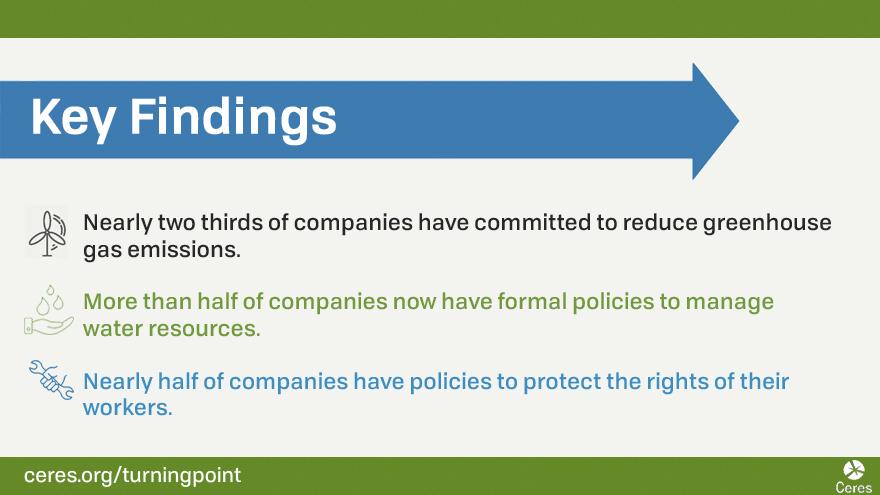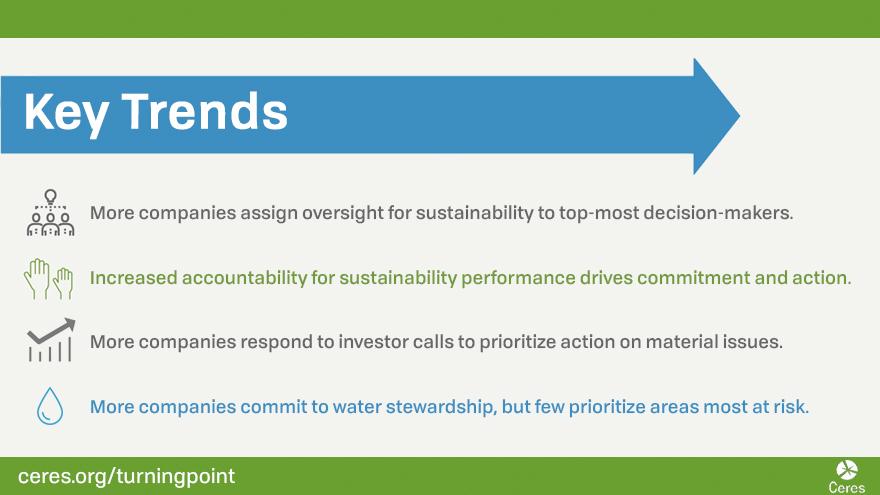Companies Show Signs of Progress, but New Ceres Analysis Calls for More Action on Sustainability Commitments
February 28, 2018 /3BL Media/ - A new interactive web-based analysis released today by Ceres examines how more than 600 of the largest publicly traded companies in the U.S. are responding to urgent calls to act on climate change and other sustainability threats, such as water pollution and scarcity, and human rights abuses, and positioning themselves for success in a world shaped by these unprecedented environmental and social challenges.
Many of the largest and most influential companies are stepping forward in greater numbers than ever before and have responded to these calls with ambitious sustainability commitments. As Ceres’ new analysis shows - TURNING POINT: Corporate Progress on the Ceres Roadmap for Sustainability - nearly two thirds of the more than 600 companies have committed to reduce greenhouse gas emissions, more than half of the companies assessed now have formal policies to manage water resources, and nearly half have policies to protect the rights of their workers.
Using the most available data from research provider Vigeo Eiris, TURNING POINT specifically takes a closer look at the progress these companies have made against 20 key expectations of sustainability leadership within the areas of governance, disclosure, stakeholder engagement and environmental and social performance as outlined in the Ceres Roadmap for Sustainability. The analysis highlights those companies who are meeting many of the Ceres expectations to improve resilience in their operations and global supply chains, and calls on all companies to scale up action on sustainability commitments.
Citi, The Coca-Cola Company, CVS Health, Gap, Inc., General Mills, Intel, Kellogg Company, NIKE, Inc., and PepsiCo are among the companies meeting many of the Ceres expectations and taking the path beyond business as usual.
“We have reached a turning point,” said Amy Augustine, senior director of the Ceres Company Network, and co-author of TURNING POINT. “It is no longer just about raising the ceiling. It is about lifting the floor. The time has come for bold and scalable solutions, not just from a few leading companies, but from companies in all sectors and of all sizes who need to transition from making commitments to taking concrete actions.”
However, as the new analysis also shows, many companies are neither acting as quickly nor as boldly as they should to truly transform into sustainable enterprises and ready themselves for a future beset with environmental and social challenges. Most notably, 69 percent of the companies assessed call on their suppliers to address environmental and social impacts, while only 34 percent actually provide the tools and resources to incentivize action. Furthermore, compared with the 64 percent of companies with commitments to reduce greenhouse gas emissions, only 36 percent set time-bound, quantitative targets -- and only a quarter of those targets commit to reducing emissions by at least 25 percent by 2020.
Key trends include:
- More companies are assigning oversight for sustainability to top-most decision-makers. 65 percent of companies hold senior-level executives accountable for sustainability performance, up from 42 percent in 2014.
- Increased accountability for sustainability performance drives commitment and action. 98 percent of companies who have commitments to reduce greenhouse gas emissions and 97 percent of companies with targets to manage water impacts hold senior-executives accountable for sustainability performance.
- More companies are responding to investor calls to prioritize action on material issues. 32 percent of companies conduct materiality assessments—a huge leap from just 7 percent doing so in 2014. However, just 6 percent disclose how the results are then guiding strategic planning and decision-making.
- More companies commit to water stewardship, but few prioritize areas most at risk. 55 percent of companies assessed commit to manage water use, but just 15 percent set quantitative targets prioritizing action in the parts of value chain that pose the highest risk to water resources.
“At General Mills, we know that feeding a growing population depends on a healthy planet, so we’ve taken bold actions to advance sustainability,” said Jerry Lynch, chief sustainability officer at General Mills. "Transforming our global food system and our business model requires collaboration and transparency across our supply chain, along with strong commitment from our executives and board of directors. While transformation brings many challenges, we see immense opportunities for leadership, innovation and growth as we move toward the sustainable future envisioned in TURNING POINT.”
TURNING POINT includes interactive data tables and company scorecards that help investors and companies identify leading industry practices and key sustainability trends in nearly every sector of the economy including transportation, food and beverage, financial services, oil and gas, among others.
“As the tides turn with more mainstream focus on sustainability, we need concrete and comprehensive information from companies about how they are tackling environmental and social issues,” said Betty T. Yee, California State Controller and Ceres board member. “TURNING POINT is a critical tool for smart business decisions, providing investors and shareholders with helpful insights to better understand key sustainability trends and leading industry practices.”
“At Citi, we have used the Ceres Roadmap for Sustainability expectations as guidance to organize our thoughts around sustainability best practices from the very beginning,” said Val Smith, Managing Director and Global Head of Corporate Sustainability at Citi. “We look forward to using TURNING POINT to help us identify areas where we can prioritize action and strive further toward sustainability leadership."
This is the third assessment of these companies, which represent more than 80 percent of the U.S. market share. The last Ceres assessment, Gaining Ground: Corporate Progress on the Ceres Roadmap for Sustainability, was released in 2014.
Ceres is a sustainability nonprofit organization working with the most influential investors and companies to build leadership and drive solutions throughout the economy. For more information, visit: www.ceres.org and follow: @CeresNews.



